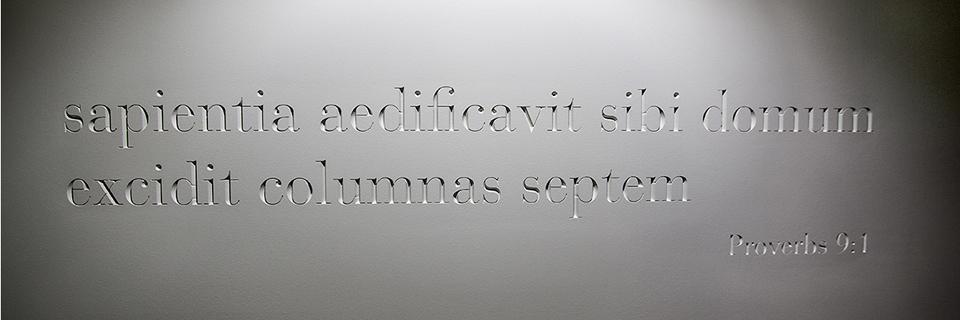Wisdom Core Curriculum to Debut in Fall 2023

In keeping with Rockhurst’s Catholic, Jesuit tradition, the University is debuting its Wisdom Core Curriculum this year. The updated curriculum helps create and reflect Rockhurst’s culture, mission and identity while keeping up with a changing world.
RU students will be challenged to discover the best version of themselves while learning to inspire others. Through its instructors, the curriculum connects with the students to promote the development of their intellectual, spiritual, moral, and imaginative capacities.
Students are encouraged to construct a framework for growth and lifelong learning. In concert with major programs of study, this curriculum prepares students to engage the complexity of the world with curiosity, compassion, ingenuity, and an abiding desire for justice. The core curriculum is an inclusive and unifying component of the Rockhurst educational mission, and includes four main components: Cornerstone Seminar, Foundation Courses, Keystone Designations, and Threshold Experiences, built in throughout each student’s four years at Rockhurst.
“Research has shown thoughtfully-designed first-year seminars to be powerful learning experiences that continue to impact students beyond the end of the course,” said Maureen Walsh, Ph.D., associate professor of Religious Studies and Theology and instructor for the Religion & Consumer Culture seminar. “This is a foundation upon which the rest of their Rockhurst education could be built. While there will be some common themes across the courses, professors have the chance to take their classes in intriguing directions that they may not be able to pursue within the standard offerings of their departments.”
Many seminars take current events and developments into account, such as Plagues, Prayer, & Politics, taught by Rick Janet, Ph.D., professor of History.
“I think the timing of such a class is obvious given the current COVID pandemic,” he said. “The purpose of this seminar is to examine how people have responded to major crises in western history, particularly outbreaks of deadly disease. How people respond to seemingly inexplicable events reveals a lot about the nature of culture, often dividing peoples into opposing camps and perspectives.
“I hope that one outcome might be that students realize that, despite our technological sophistication and presumed scientific advances today, we still react to crises in essentially the same way as past cultures – through some combination of scientific, religious, and political response.”
Shatonda Jones, Ph.D., associate professor of Communication Sciences and Disorders, will lead the Diffusion of Health Information Through Entertainment Media seminar.
“We are in a world where information is ever flowing and easily accessible,” Jones said. “But, not all information is created equal. Some information is factual, based in science/evidence, and leads to better health, while other information is less so. This course is important now because it will teach students how to critically appraise the information that is diffused to them through entertainment and disseminated to them through edutainment (e.g., entertainment mediums that have a purposeful educational component). They will learn how to leverage this knowledge in working with their own future patients and clients.”
Pictured: The Latin phrase sapientia aedificavit sibi domum, a paraphrased version of Proverbs 9:1, translates to “wisdom has built herself a home,” and is engraved in Arrupe Hall.







